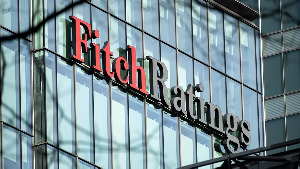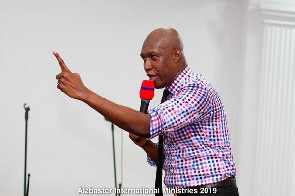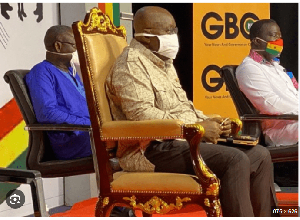“We were able to share with our staff GHC100.00 per district to undertake their works,” Ms Josephine Nkrumah, the Chairperson of the National Commission for Civic Education (NCCE) revealed in a recent interview on Ghana Television.
The GHC100.00 was meant to support each district to be able to carry out their sensitization programmes across the length and breadth of the districts to help stop the spread of the Coronavirus (COVID-19) pandemic.
“For funding we have serious challenges and also logistical constraints. This year, for instance, we have not received any money at all from the government. Our goods and services budget was GHC7million,” the Chairperson stressed.
As a young journalist who knows the mandate of the NCCE when it comes to public education and someone who has followed officials of the Commission to the communities that they go to deliver services, I wept after listening to Ms Nkrumah talk about the neglect of the Commission by major stakeholders, including the government.
Public sensitization and education, undoubtedly, is one of the major instruments needed to fight and curb the spread of the infectious coronavirus, which has brought all economies around the world to their knees.
Several stakeholders including the media, Civil Society Organizations among others undertake sensitization exercises on national events especially in the wake of the COVID-19 pandemic but that of the NCCE cover more communities especially the hard–to reach communities irrespective of the institution’s poor financial situation.
The NCCE reaches out to very remote places that no other institution does, to take civic education to the doorstep of every individual across the country. It is therefore not surprising that people from all walks of life recognize the work of the Commission.
However, the sad and most disheartening complement successive governments and other major stakeholders can offer to the Commission is to neglect and relegate it to the background when resourcing institutions to undertake their constitutional mandated obligations.
An independent investigation by this writer revealed that the NCCE, since 2009 has been working under the distressed financial situation, yet successive governments have acted as if they did not care for the Commission.
Emergence of coronavirus
The Corona Virus Disease pandemic, popularly known as COVID-19 was first reported in Wuhan, an industrial city in the Asia country, China, in December 2019 and it is an infectious disease caused by a newly discovered coronavirus called, “Coronaviridae”, according to the World Health Organization (WHO).
Most people infected with the virus, WHO says, experience mild to moderate respiratory illness and recover without requiring special treatment, however, older people with underlying medical complications and other chronic diseases such as diabetes, cancer and cardiovascular disease are likely to develop serious problems.
According to health experts, the virus is primarily spread through droplets of saliva or discharge from the nose when an infected person coughs or sneezes. For now there is no approved drug or vaccine for the disease.
Globally, over 4.5 million people have been infected with the virus and over 259,000 lives have been lost spanning across 212 countries and territories. This has brought to a halt many major economic and social activities.
In Ghana, the first two confirmed cases of COVID-19 were reported on March 12, 2020, and it has so far infected almost 6,000 persons with 28 deaths. The situation led government to take drastic measures including suspension of public gatherings, such as schools, churches, closure of borders among other things in a bid to contain the spread of the disease.
Other measures being advocated and practiced include wearing of nose masks, regular handwashing with soap under clean running water, rubbing the hands with alcohol-based hand sanitizer and social distancing.
Government on the other hand, has rolled out numerous measures including the enactment of the imposition of Restrictions Act, Act 1012, closure of the country’s borders, and a ban on public gathering among others to prevent the spread of the virus.
One does not need a sorcerer or sorceress to know that intensive and sustained public education which is one of the key roles of the NCCE is the major tool in fighting the pandemic.
Work of NCCE
The NCCE, established as an independent and non-partisan state institution under Article 231 of the 1993 Constitution of Ghana is charged with the main responsibility of promoting and sustaining democracy as well as inculcating into the citizenry the awareness of their rights and obligations, through civic education.
This clearly emphasizes the point that the Commission when resourced efficiently could intensify its public education to reach more of the general public to help fight the disease.
According Mr Pontius Pilate Baba Apaabey, the Upper East Regional Director, NCCE, the NCCE’s work is to sustain the campaign or education on any issue as long as possible until sufficient results are realized and that is what the Commission has always done.
He stated for instance that the sustained efforts of the NCCE in the fight against corruption in the country could not be underestimated especially at a point where all institutions which used to support the fight had gone to rest.
The Commission’s work has whipped up the interest of many people and they express interest in participating and learning more about some of the government’s social intervention programmes.
The just- ended district level elections and the referendum which was cancelled is one of the classic examples where the Commission played its public education role so well.
According to Mr Apaabey, the Church of Pentecost has supported the Commission with 10 mobile cinema vans to help carry out the sensitization exercise with each van per each of the then 10 regions.
He said before the government came out to announce the first measures it was putting in place to contain the spread of the COVID-19 in the country, the NCCE had already begun sensitizing the public on the dangers associated with the disease and the restrictions being outlined by government.
The Regional Director indicated that with support of the vans from the Church of Pentecost, the NCCE especially the Upper East Regional Directorate of the Commission, was able to travel to almost all the communities in the 15 Municipal and Districts in the Region to sensitize communities on the spread of the virus.
He indicated that a second phase of public education across the communities in the Region was being rolled out in districts and officials would intensify education on the preventive and safety protocols such as social distancing and wearing of nose masks, which has now been made compulsory.
It is therefore encouraging that Government recently donated 10,000 face masks, 10,000 examination gloves, 40 gallons of hand sanitizer, 40 gallons of rubbing alcohol, 20 thermometer guns, 360 pieces of cocoa drink and 90 packets of tissue rolls to the Commission to boost these activities countrywide.
According to a Ghana News Agency report, President Akufo Addo, in his ninth address to the nation, pledged to empower the NCCE as a frontline civic educator to lead the process of public education across the country.
The way Forward
It should be pointed out that notwithstanding the challenges faced by the Commission it has over the years contributed significantly in deepening Ghana’s democracy and creating awareness on national issues including the current COVID-19 pandemic.
Examining the important roles the country’s Constitution assigned to the Commission, there is the urgent need for the Government and other development partners to resource the Commission with vehicles and logistics to deliver on mandate efficiently particularly in this era of COVID-19 and the President’s pledge, if carried out will contribute significantly to the fight against the disease.
The Regional Director, though, acknowledged the immense support of some benevolent institutions and organizations such as the European Union (EU), Ghana Integrity Initiative (GII) and The United Nations Development Programme (UNDP) to the work of the Commission.
While we applaud the Church of Pentecost for supporting the Commission with mobile cinema vans to carry out a four-week sensitization programme across the country on the coronavirus pandemic, it behooves every individual, Non-Governmental Organizations, CSOs to support the Commission serve the ordinary Ghanaian for national development and progress.
Opinions of Sunday, 17 May 2020
Columnist: Anthony Adongo Apubeo















